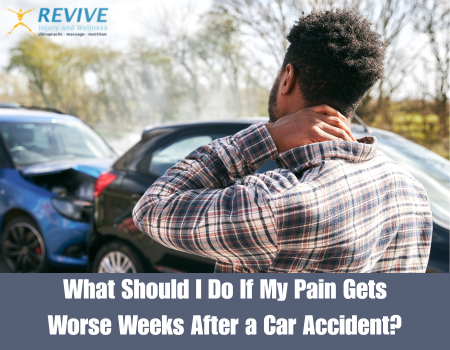Recovering from a car accident isn’t always a straightforward journey. While some people start to feel better within days, others may notice pain appearing or intensifying weeks after the incident. This delayed discomfort can be confusing and unsettling, especially if you initially thought your injuries were minor.
If you’re experiencing new or worsening pain long after the accident, it’s important to understand why this happens and what you should do about it.

Why Pain Can Show Up or Worsen Weeks After a Car Accident
After a collision, the body often goes into survival mode. In the immediate aftermath, stress hormones like adrenaline flood your system, which can temporarily numb pain or mask symptoms. Once those hormone levels drop, the full extent of your injuries may become clearer.
Additionally, some injuries naturally take time to develop. Swelling, bruising, and inflammation might not peak until several days or even weeks after the event. In other cases, certain physical issues can gradually worsen if left untreated, making delayed pain a real and common experience.
Car Accident Injuries That Might Cause Delayed or Progressive Pain
Several types of injuries from car accidents are known for either delayed onset or symptoms that intensify over time. These include:
- Soft Tissue Damage: Injuries like sprains, strains, and muscle tears often worsen gradually as inflammation increases or the injured area is repeatedly strained.
- Neck and Back Strain (Whiplash): Neck injuries from sudden head movement can take days to become fully noticeable, resulting in stiffness, headaches, and shoulder pain.
- Herniated or Bulging Discs: Damage to the spine can cause radiating pain, numbness, or weakness, sometimes surfacing after the initial swelling subsides.
- Concussions and Head Trauma: Symptoms like headaches, confusion, memory issues, or irritability might be subtle at first and grow more persistent over time.
- Internal Bruising or Organ Damage: In rare cases, internal injuries don’t produce immediate symptoms but can develop serious signs, such as abdominal discomfort or dizziness, much later.
When to Be Concerned
While some mild aches can be expected during the recovery period, certain symptoms should never be dismissed. It’s important to see a doctor if you experience any of the following:
- Constant or increasing pain in your neck, back, head, or limbs
- Numbness, tingling, or unusual weakness
- Dizziness, blurred vision, or problems focusing
- Unexplained swelling, bruising, or sensitivity
- Pain that disrupts your sleep, mobility, or daily activities
Ignoring these warning signs can lead to chronic issues or more complicated health concerns later.
Steps to Take If Your Pain Gets Worse Weeks After a Car Accident
If you notice new discomfort or your existing pain is intensifying weeks after your accident, here’s what you should do:
1. Acknowledge and Monitor the Symptoms
Don’t dismiss new pain as something insignificant. Take note of when it began, how it feels, and whether it’s affecting your movement or sleep.
2. See a Healthcare Professional
Schedule an evaluation with a medical provider, even if you’ve already been checked immediately after the accident. A second assessment may uncover issues that weren’t visible or problematic at first.
3. Track Your Progress
Documenting your symptoms and daily limitations can be helpful for both medical treatment and, if needed, insurance claims or legal proceedings.
4. Follow Through With Treatment
If your doctor recommends physical therapy, medications, or other treatments, make it a priority. Delaying care or stopping therapy prematurely can cause lingering or worsening pain.
5. Address Emotional and Psychological Health
Physical pain after a traumatic event is often accompanied by emotional strain. Anxiety, stress, and unresolved trauma can amplify physical discomfort. Speaking with a counselor or therapist can help manage both the emotional and physical aftermath of the accident.
Why Prompt Action Matters
Leaving delayed or worsening pain untreated can turn temporary injuries into long-term health problems. Early intervention often prevents complications and promotes faster, more complete recovery. Even if the pain seems tolerable now, seeking medical advice ensures it won’t silently progress into a chronic issue.
Experiencing pain weeks after a car accident isn’t unusual, but it’s something you should take seriously. Whether it’s a dull ache, sharp twinge, or growing discomfort, your body is signaling that it needs attention. By recognizing the symptoms, getting professional care, and following through with treatment, you can protect your health and support your recovery.
Your well-being is worth prioritizing — no matter how much time has passed since the accident.


